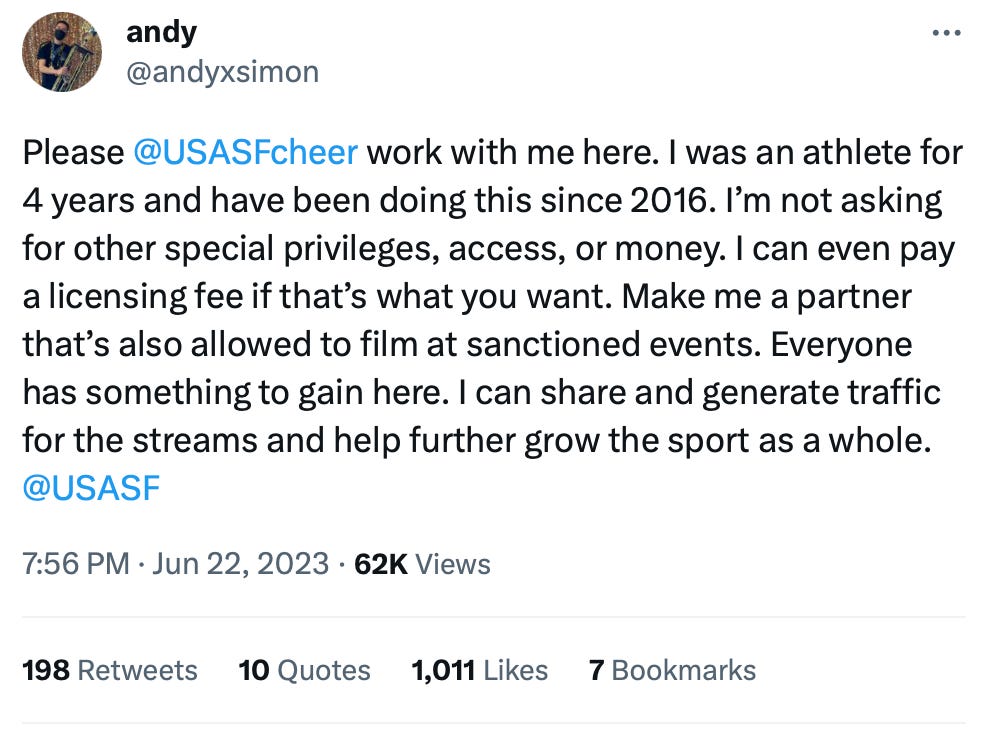- Sep 12, 2020
- 93
- 15
6 years of cheerleading is gone, Varsity lawsuit update & get ready for the European Championships! Here are some of the latest news in cheerleading:
The USASF has gotten Andy’s youtube channel deleted, which has resulted in a ton of backlash for the organization. That means 6+ years of great cheerleading and history is gone… Unless you pay for the competition live streams & replays with *debatable* quality…
Now, our whole brand is built on the idea that cheerleading should be available to everyone & that more quality content should be available for free, like Andy’s videos. It benefits everyone in the sport & ultimately helps it grow!
Our own youtube channel, for example, would be nothing without Andy’s hard work providing the best videos.

Tons of athletes, parents, fans of the sports, and big-name gyms are now demanding the USASF to retract their claims, which would bring back the channel.
A judge in one of the lawsuits against Varsity decided that former cheerleaders who said they were sexually abused by their coaches can continue moving forward with their lawsuits against Varsity Brands and Varsity Spirit.
But the judge didn't agree with some other claims the lawsuits made, including “racketeering activity, fraud and civil conspiracy.“
Read the full article here.

The best & biggest cheerleading youtube channel got deleted (+ how to help)
Ever seen a high-quality video of a routine on youtube? Chances are it was from Andy Simon’s channel!The USASF has gotten Andy’s youtube channel deleted, which has resulted in a ton of backlash for the organization. That means 6+ years of great cheerleading and history is gone… Unless you pay for the competition live streams & replays with *debatable* quality…
Now, our whole brand is built on the idea that cheerleading should be available to everyone & that more quality content should be available for free, like Andy’s videos. It benefits everyone in the sport & ultimately helps it grow!
Our own youtube channel, for example, would be nothing without Andy’s hard work providing the best videos.

Tons of athletes, parents, fans of the sports, and big-name gyms are now demanding the USASF to retract their claims, which would bring back the channel.
Want to help? Here are a few ways:
- Sign the petition urging USASF to bring back the channel
- Contact news stations & publications and ask them to cover this topic
- Contact the USASF (by commenting, emailing, etc) asking them to remove their claims
- Share this info with everyone you know & get them to help
Update on one of the Varsity lawsuits
Trigger/content warning: sexual abuse. Please skip reading this if you need to.A judge in one of the lawsuits against Varsity decided that former cheerleaders who said they were sexually abused by their coaches can continue moving forward with their lawsuits against Varsity Brands and Varsity Spirit.
But the judge didn't agree with some other claims the lawsuits made, including “racketeering activity, fraud and civil conspiracy.“
Read the full article here.
This weekend: ICU European Championships
The European Championships is taking place this weekend (in Verona, Italy) featuring teams from, you guessed it, all over Europe!- See the competing teams, performance orders, and more by clicking here.
- The competition will be live-streamed on the ICU Network and the Olympic Channel.
